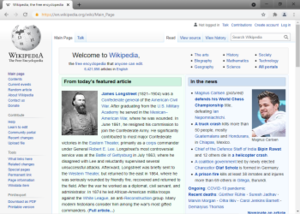Comodo Dragon
 |
|

Comodo Dragon 16.1, running on Windows 7, showing a security alert after opening
|
|
| Developer(s) | Comodo Group |
|---|---|
| Stable release |
52.15.25.664 (October 5, 2016)
|
| Development status | Active |
| Operating system | Microsoft Windows |
| Engine | Blink |
| Platform | IA-32 |
| Size | 53.8 MB |
| Available in | Español |
| Type | Web browser |
| License | Freeware |
| Website | browser |
Comodo Dragon is a freeware web browser. It is based on Chromium and is produced by Comodo Group. Sporting a similar interface to Google Chrome, Dragon does not implement Chrome's user tracking and some other potentially privacy-compromising features, substituting them for its own user tracking implementations, and provides additional security measures, such as indicating the authenticity and relative strength of a website's SSL certificate.
Upon installation, Comodo Dragon offers the opportunity to configure either the Comodo Dragon or the user's entire computer to use Comodo's own DNS servers instead of the user's Internet service provider. Comodo Dragon performs additional checks on the SSL digital certificates of secure websites, and informs users if a site's certificate may be of insufficient strength. It includes an on-demand site inspector designed to determine if a site hosts malicious code.
Instead of Google Updater, Comodo Dragon features its own built-in updater. If Dragon is uninstalled, users are given the option of keeping Dragon's cache and cookie files or deleting them.
In addition, the following Google Chrome features are removed or disabled in Dragon:
A Google engineer publicly disclosed a serious security vulnerability in Comodo Dragon after Comodo failed to respond to the issue within the 90 days Google provides software vendors. The advisory warns users who install Comodo Dragon that Dragon replaces their default browser, hijacks DNS settings, and disables the same origin policy, which exposes users by allowing malicious websites to access private data. However, these problems have since been fixed.
...
Wikipedia
